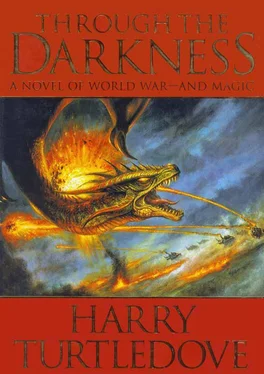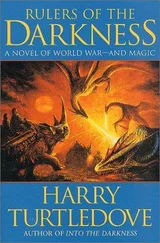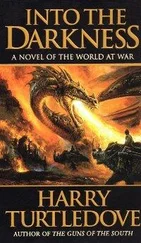Harry Turtledove - Through the Darkness
Здесь есть возможность читать онлайн «Harry Turtledove - Through the Darkness» весь текст электронной книги совершенно бесплатно (целиком полную версию без сокращений). В некоторых случаях можно слушать аудио, скачать через торрент в формате fb2 и присутствует краткое содержание. Жанр: Фэнтези, на английском языке. Описание произведения, (предисловие) а так же отзывы посетителей доступны на портале библиотеки ЛибКат.
- Название:Through the Darkness
- Автор:
- Жанр:
- Год:неизвестен
- ISBN:нет данных
- Рейтинг книги:5 / 5. Голосов: 1
-
Избранное:Добавить в избранное
- Отзывы:
-
Ваша оценка:
- 100
- 1
- 2
- 3
- 4
- 5
Through the Darkness: краткое содержание, описание и аннотация
Предлагаем к чтению аннотацию, описание, краткое содержание или предисловие (зависит от того, что написал сам автор книги «Through the Darkness»). Если вы не нашли необходимую информацию о книге — напишите в комментариях, мы постараемся отыскать её.
Through the Darkness — читать онлайн бесплатно полную книгу (весь текст) целиком
Ниже представлен текст книги, разбитый по страницам. Система сохранения места последней прочитанной страницы, позволяет с удобством читать онлайн бесплатно книгу «Through the Darkness», без необходимости каждый раз заново искать на чём Вы остановились. Поставьте закладку, и сможете в любой момент перейти на страницу, на которой закончили чтение.
Интервал:
Закладка:
“Married,” Vanai said in wondering tones. Then she chuckled, not altogether pleasantly. “My grandfather would pitch a fit.”
“I hope he’s alive to pitch a fit,” Ealstan said.
“On the whole, so do I,” Vanai answered, and he shut up in a hurry.
When they got back to the flat, he unlatched the door. He motioned for Vanai to go in ahead of him. While she was in the doorway, he stepped in beside her, took her arm so she couldn’t fully pass into the flat, and gave her a kiss. She squeaked. “That’s what we do at proper Forthwegian weddings,” he said, “not the kind where the fee is the only thing that makes it real.”
“I knew that. I’ve seen Forthwegian weddings in Oyngestun,” Vanai said. “At a proper Kaunian wedding, there would be flowers and there would be olives and almonds and walnuts-oh, and mushrooms, too, of course-for fruitfulness.” She sighed and shrugged. “However we did it, I’m glad I’m married to you.”
Ealstan hadn’t thought anything could make up for the shabby ceremony-no ceremony at all, really-and for the goons who’d tried to make sure he and Vanai weren’t Kaunians in sorcerous disguise. But that double handful of words did the job. He kissed her again, this time for the sake of the kiss, not for anything else. Then he said, “I bet there’s one part of the wedding-or right after the wedding-that’s the same for Forthwegians and Kaunians.”
Vanai cocked her head to one side. “Oh?” she said. “Which part do you mean?
He wanted to grab her. He wanted to take her hand and set it on the part of him he had in mind. He did neither. He’d seen she didn’t care for such things-in fact, she sometimes froze for a moment when he did them. He still didn’t know exactly what had happened to her before they came together, but he thought something bad had. One day, she might decide to tell him. If she did, fine. If she didn’t… he would live with that, too.
And she was still standing there smiling, waiting for his answer. “Come into the bedchamber,” he said, “and I’ll show you.”
He did. She showed him, too. They lay side by side, waiting for him to rise for another round. He was eighteen; it wouldn’t take long. Stroking her, he said, “That’s better magic than any the sorcerers work.”
“It is, isn’t it?” Vanai said. “I wonder if it was the very first magic, and everything else grew out of it.”
“I don’t know. I don’t suppose anyone else knows, either,” Ealstan said. After a little while, they began again. The oldest magic of all, if that was what it was, had them well and truly-and happily-ensnared.
Talsu got up from the supper table. “I’m off,” he said in Jelgavan, and then, in classical Kaunian, “I go to learn my lesson.”
Gailisa beamed at him. “You sound so smart when you speak the old language.”
“Only goes to show you can’t always tell,” Ausra remarked.
Trying to smile at his wife and glare at his sister at the same time, Talsu feared he ended up looking foolish. “Don’t bother waiting up for me,” he said, and went downstairs, out the front door, and onto the dark, quiet streets of Skrunda.
With the winter solstice not long past, nightfall came early. So it seemed to Talsu, at any rate. From what he’d read about how things worked down in places like Kuusamo and southern Unkerlant, though, he knew they had it worse. And in the land of the Ice People, the sun didn’t come up for days- sometimes for weeks, if you went far enough south-at a time. He tried to imagine that, tried and felt himself failing.
A constable strode past, twirling his truncheon. He was a Jelgavan, but no Jelgavan before the war would have swaggered that way. Learned something from the Algarvians who give you orders? Talsu thought.
Almost as if the constable had heard the thought, he barked at Talsu: “Curfew’s coming soon. You’d better be off the streets!”
“Aye, sir. I will,” Talsu said. That was true. He’d get to the house of Kugu the silversmith before the curfew hour. And then, because Skrunda would only get darker to foil any dragons that might fly overhead, he would sneak home again. The constables hadn’t caught him yet, and he didn’t expect that they would.
Even in the dark, he knew the way to Kugu’s. He’d been there many times now. When he rapped on the door, Kugu opened it and peered out into the gloom through his thick spectacles. “Ah, Talsu Traku’s son,” he said in the classical tongue. “Come in. You are very welcome.”
“I thank you, sir,” Talsu answered, also in classical Kaunian. “I am glad to be here. I am glad to learn.”
And that was true. He hadn’t worried much about Kaunianity before the war. As far as he’d thought about such things-which wasn’t very far-Jelga-vans were Jelgavans, Valmierans were Valmierans (and not to be trusted because they talked funny), and the blond folk left in the far west were mere unfortunates (and they talked even funnier: they still used the classical tongue among themselves).
But if many of the Algarvians knew classical Kaunian, and if they were so eager to destroy monuments from the days of the Kaunian Empire in Jelgava and Valmiera, didn’t that have to mean there was something to the matter of Kaunianity, of all folk of Kaunian descent being in some sense one? That was how it looked to Talsu, and he wasn’t the only one in Skrunda to whom it looked that way.
As usual, he sat down at the big table bedecked with dice and with stacks of coins. If the Algarvians suddenly burst in, it would look as if the students were in fact nothing but gamblers. Talsu wondered if Mezentio’s men-or the Jelgavan constables who served under Mezentio’s men-would care. He doubted it. If the redheads or their stooges came bursting in, someone would have betrayed Kugu and those who learned from him.
He exchanged nods and greetings, sometimes in Jelgavan, sometimes in the old speech, with the others who visited Kugu every week. Everyone watched everyone else. Talsu wondered which of his fellow students had painted slogans on the walls of Skrunda in classical Kaunian. He wondered if they had any real organization. He rather thought so. Most of all, he wondered how to join it, how to say he wanted to join it, without running the risk of betrayal to the Algarvians.
“Let us begin,” Kugu said, and Talsu knew that verb form was a hortatory subjunctive, a bit of knowledge he couldn’t have imagined having a year earlier. The silversmith went on, still in classical Kaunian, “We shall continue with indirect discourse today. I shall give a sentence in direct speech, and your task will be to turn it into indirect discourse.” His eyes darted from one man to the next. “Talsu, we shall begin with you.”
Talsu sprang to his feet. “Sir!” He knew Kugu wouldn’t take a switch to him if he erred, but memories of his brief schooling lingered even so.
“Your sentence in direct speech is, ‘The teacher will educate the boy,’ “ Kugu said.
“He said. . the teacher … would educate … the boy,” Talsu said carefully, and sat down. He was beaming. He knew he’d done it right. He’d shifted teacher into the accusative case from the nominative, and he’d remembered to make would educate a future infinitive because the conjugated verb in the original sentence was in the future tense.
And Kugu nodded. “That is correct. Let us try another one. Bishu!” This time he pointed at a baker. Bishu botched his sentence. Kugu didn’t take a switch to him, either. He patiently explained the error Bishu had made.
Around the room the sentences went. Talsu did make a small mistake on his second one. Since others had done worse before him, he didn’t feel too embarrassed. He didn’t think he’d make that mistake again, either.
Читать дальшеИнтервал:
Закладка:
Похожие книги на «Through the Darkness»
Представляем Вашему вниманию похожие книги на «Through the Darkness» списком для выбора. Мы отобрали схожую по названию и смыслу литературу в надежде предоставить читателям больше вариантов отыскать новые, интересные, ещё непрочитанные произведения.
Обсуждение, отзывы о книге «Through the Darkness» и просто собственные мнения читателей. Оставьте ваши комментарии, напишите, что Вы думаете о произведении, его смысле или главных героях. Укажите что конкретно понравилось, а что нет, и почему Вы так считаете.












